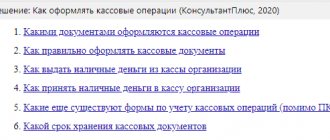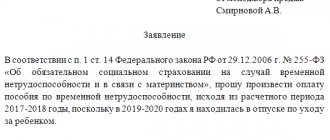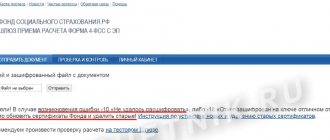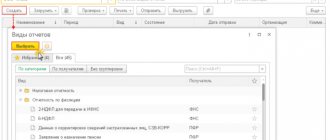Advance report: form
Resolution of the State Statistics Committee of Russia dated 01/08/2001 N 55 provides for a certain form of advance report, which is designated as N AO-1.
But since 2013, it is optional, and the company has the right to focus on its own form, taking into account the requirements for mandatory details of Federal Law N 402-FZ dated 06/12/2011 “On Accounting” (Part No. 2 Article No. 9).
Nevertheless, most organizations prefer to use the approved Form N AO-1.
Checking advance reports of accountable persons
In order to account for the funds received and spent, the accountant needs to draw up an advance report and attach to it documents that will serve as the basis for accepting the expenses incurred - checks, BSO, invoices, travel tickets, slips (for payments by bank card), etc. d.
How to prepare an advance report, read this article.
If the advance was issued by transfer to the employee’s salary or accountable card, then the payment order must indicate that the money transferred is accountable. To receive accountable amounts on a bank card, the employee is recommended to write an application requesting the issuance of money for a certain time and indicating the card details - this is stated in the letter of the Ministry of Finance dated August 25, 2014 No. 03-11-11/42288. In the same letter, officials report that it is advisable to develop and consolidate the procedure for issuing an advance for household needs by non-cash means and drawing up an advance report and establishing it in the accounting policy of the enterprise.
The form for the advance report can be form AO-1, approved by the State Statistics Committee of Russia dated August 1, 2001 No. 55. It is not mandatory, therefore it is allowed to develop your own report form for the advance received, taking into account the specifics of the enterprise and compliance with all the requirements for filling out the necessary details in accordance with paragraph. 2 of the Law “On Accounting” dated December 6, 2011 No. 402-FZ.
Find the advance report form and a sample of how to fill it out here.
The report form must have space reserved for completion by the employee and the accountant. The document has a front and back side. First, the employee fills out the part intended for him on the front side, in which he indicates information about himself and the purpose of the advance received. Then, on the reverse side, he lists all supporting documents indicating their names, numbers, dates, amounts (for each separately). The total is calculated and indicated. Documents are attached to the report. For ease of use, they can be numbered in accordance with the serial number assigned in the expense report.
The employee passes the completed form with attached originals about expenses to the accountant, who checks the received document:
- according to the form - the correctness of filling out all the necessary lines, the presence of the specified documents, the usefulness of their execution, the correct transfer of data from the originals to the report, the correspondence of the amounts, the presence of signatures;
- in terms of content - the intended purpose of the expenses incurred, the reliability of the documents, the correspondence of the specified dates to the time for which the advance was issued;
- by arithmetic calculation - the total amount in the report is checked, which must be repaid in this sub-report.
IMPORTANT! After receiving the advance report from the accountant, the accountant must give him a receipt stating that he accepted the report with the attached documents for verification.
The report, verified and signed by the accountant and chief accountant, is submitted to the manager or authorized person for approval. By signing, the director agrees to consider the costs incurred to be justified.
The deadline for submitting the advance report to the accounting department for verification and approval of the report for the advance for the needs of business activities is established by the manager at his discretion. It is recommended to consolidate them in the accounting policies. Based on the approved report in the accounting department, accountable amounts are written off in accordance with the procedure established by law.
S. N. Shalyaev, 1st Class Advisor to the State Civil Service of the Russian Federation, answered individual questions from taxpayers. You can study the specialist’s answers in ConsultantPlus. Get trial access to the K+ system and get acquainted with the official’s point of view for free.
Drawing up an advance report: who should do it
Paragraph No. 2, clause 6.3, contained in document Directive N 3210-U, states that the advance report must be filled out by the person who previously received the funds, and then it must be taken to the accounting department. Who are the accountable persons:
- company employees;
- freelancers, participants in a civil contract (for example, a contract, a contract for the provision of services). We are talking only about individuals. In this case, they are equal to the company’s employees according to the letter of the Bank of Russia dated 02/10/2014 N 29-Р-Р-6/7859. Thus, the issuance of funds on account and the final settlement with them are carried out in the same way as with full-time employees of the company.
Is it necessary to submit an advance report if the accountable money has not been spent?
There are no clear instructions on this matter in Bank of Russia Directive No. 3210-U. It only spells out the reporting procedure if the accountable money has been spent.
Therefore, if an enterprise decides to oblige the submission of an advance report even for unused accountable amounts, there will be no error in this.
Moreover, if the enterprise practices endless reporting (that is, when funds are endlessly given to the director of the enterprise so as not to hand them over to the bank), then an advance report, even without reflecting the expenditure of funds in it, will not be superfluous.
Moreover, often tax authorities, when they present their claims to such “endless” sub-reports, point specifically to the lack of a report on them (for example, the Resolution of the Seventh Arbitration Court of Appeal of the Russian Federation dated March 26, 2014 in case No. A67-5875/2013).
Besides:
- Clause 6.3 of the Bank of the Russian Federation Directive No. 3210-U contains wording about the advance report as a document that reflects the state of the money issued for the report. Moreover, the “supporting documents” attached to the expense report can be not only the primary document indicating the expenditure of funds, but also their withdrawal from the corporate card (if the accountable money was transferred to the employee’s card) and other documents;
- in the same paragraph 6.3. it is said that the final payment is made on the basis of the advance report. This formulation applies to both fully and partially spent funds, and not spent money at all.
Thus, analyzing the provisions of this clause 6.3, we can conclude that the advance report must be submitted by the accountable person, regardless of the fact of using or not using the money received by him within the permitted period. And must also be submitted within no later than 3 working days.
What if accountable money was transferred to a corporate card? In this case, is it necessary to submit an advance report and comply with the deadlines and reporting procedure provided for in clause 6.3. Instructions of the Bank of Russia No. 3210-U?
Advance report: deadline for submission
The document must be provided within three working days:
- after the last day of the period for which the money was issued;
- from the day the reporting person started work (after illness/vacation or return from a business trip).
Example. Date calculation
Situation 1:
The funds were issued on 05/15/2017 (that is, on Monday) for 5 working days.
In this case, the first working day ends on Tuesday 05/16/2017, and the fifth one ends on the following Monday, that is, 05/22/2017.
Thus, the report must be submitted within 3 working days from 23/05 to 25/05.
Situation 2:
Money was spent on travel expenses.
The business trip ends on 05/19/2017, Friday.
The employee returns to his usual workplace on Monday 22/05, and to submit an advance report he will have 3 days from 23/05 to 25/05.
At what point does the obligation to submit an advance report arise?
The only regulatory document that establishes deadlines for reporting on money issued for reporting is Directive of the Bank of Russia No. 3210-U dated March 11, 2014 “On the procedure for conducting cash transactions.” In clause 6.3 (paragraph 2) of this Directive it is established that the deadline for submitting an advance report is three working (!) days . And many novice accountants mistakenly start counting this three-day period from the moment the funds are issued for reporting.
In fact, the three-day reporting period begins:
- from the day following the end of the period for which the funds were issued for the report . This period in each specific case is established in the application of the person who asks to give him money on account. Moreover, the head of the organization (or entrepreneur) can either confirm the period for which the employee is asking for funds or change it by extending or shortening it. And it is precisely this period, which the manager approved in the application, that will be considered official. And it is upon its completion that within 3 working days the employee will be obliged to report on the expenditure of the funds issued to him;
- from the day the employee returns to work . As a rule, this period is “used” when the employee returns from a business trip. But it would not be a mistake to apply the specified period to an employee’s return from sick leave or vacation, for example. Also, very often this formulation is used in the case when the three-day period for the report falls on weekends and (or) non-working holidays. After all, the employee must report within 3 working days, not calendar days .
It is worth noting that Bank of Russia Directive No. 3210-U contains in paragraph 2, clause 6.3 an indication of a 3-day deadline for reporting on accountable funds, as the maximum period within which reporting must be done. But it would not be a mistake if the employee provides an advance report much earlier. For example, long before the end of the period for which funds were issued to him on account.
In addition, the Directive of the Bank of the Russian Federation No. 3210-U does not contain restrictions on the duration of the period for which funds can be issued . In other words, money can be issued for a month, six months, or even a year. Moreover, this period should be approved in an order or at the disposal of the head of the enterprise (entrepreneur).
However, paragraph 7 of Directive No. 3210-U provides for the obligation for a legal entity and entrepreneur to determine:
- measures to ensure the safety of cash during cash transactions (and the issuance of money for reporting and reporting on them refers to cash transactions), during transportation and storage of money;
- the procedure and timing of inventory in order to establish the actual availability of cash in the cash register.
Therefore, if the period for which the funds are issued on account is quite long, then the organization and the entrepreneur should take measures to control these funds.
For example, periodic submission of an advance report with documents confirming expenses during the period for which the money was issued. Moreover, no one prohibits such control. Indeed, clause 6.3 of Directive No. 3210-U reflects only the obligation of the accountable person to submit an advance report within the deadline provided for this purpose.
And one more point: if both the employee (accountable person) and the accountant (chief accountant or head of the enterprise) who accepts the expense report have the same work schedule, then the 3 working days provided for submitting the expense report will not cause difficulties. What if an accountant or other authorized person works only 5 days a week, and the accountable person works according to his own schedule?
In this case, you need to consider the following:
- clause 6.3 of Bank of Russia Directive No. 3210-U clearly states that the advance report must be presented to an accountant or chief accountant (or the head of the enterprise, if there is no accountant position on staff);
- The advance report must be submitted within 3 working days either after the expiration of the period for which the funds were issued or from the day the employee returns to work.
It is quite difficult to combine these two requirements if the accountable person and the accountant have different work schedules. Therefore, it is possible to provide in the Regulations on Accountable Persons (for example) the submission of an advance report to an authorized person , who will do this in the absence of the accountant (chief accountant, manager).
Application for issue
To issue cash to an employee for reporting purposes, you need a cash receipt order. The accountable person must draw up a written statement in any form, where there will be a record of the amount of funds required. The manager's resolution confirms or corrects the request, so the application must also contain the date and signature of the manager. These are required details.
The regulatory act does not provide for an application form, so it can be drawn up in any form, but it can also be approved by the organization’s LNA.
Accounting entries
The employee, in Form N AO-1, provides an advance report on the funds he spent.
The remainder is returned to the cashier.
With the consent of the manager, the employee is reimbursed for overexpenditure if more money was spent than expected.
How are these transactions reflected in accounting:
Issuance of funds
Accountable funds received by the employee: Debit 71 – Credit 50.
Approval of the advance report
Goods (services or work) paid for by the accountable are accepted for accounting. These could be travel expenses, stationery, notary services: Debit 10 (08, 20, 26, 44) – Credit 71.
The balance of unspent money was received from the employee: Debit 50 – Credit 71.
The overexpenditure on the advance report was returned to the employee: Debit 71 – Credit 50.
Payments using a plastic card
Money for spending on a corporate card was issued to the employee: Debit 55 – Credit 51.52.
Money was withdrawn from the corporate card by the employee (accountable funds were issued): Debit 71 – Credit 55.
The debit of funds from the account is reflected without confirmation of accompanying documents: Debit 73 – Credit 55
.
To reimburse expenses, the employee contributed cash: Debit 50 – Credit 73.
Funds spent on the corporate card for personal needs are deducted from the employee’s salary: Debit 70 – Credit 73.
In certain cases, accountable amounts may be withheld from an employee's salary. The following wiring will be required:
Reflection of accountable amounts that were not returned within the prescribed period: Debit 94 – Credit 71.
Accountable money not returned within the prescribed period is withheld from the salary of the accountable person: Debit 70 – Credit 94.
Accountable person's advance report approved: posting
If, according to the advance report, more than the advance received has been spent, the employee is given an overspend. If not all accountable money has been spent, the remainder must be returned to the enterprise's cash desk (the accountant will issue a receipt order for it, the counterfoil will be given to the accountant).
An employee can also spend personal money to purchase something necessary for the company, for example, fuel and lubricants for a company car. In this case, a report is first submitted, and then the funds are reimbursed. Such an action must also be permitted by internal regulations.
If the accountable person does not meet the deadline established by the enterprise for submitting the advance report and does not return the balance of the accountable amounts, the employer has the right to reimburse the debt from his salary (Article 137 of the Labor Code of the Russian Federation).
At the time of checking the advance report, the money issued is reflected in Dt 71 “Settlements with accountable persons”. After approval by his manager, the accountant needs to make entries according to Kt 71 in correspondence with the accounts of expenses incurred:
| Debit | Credit | Contents of operation |
| 71 | 50, 51 | Accountable money issued |
| 20 (23, 25, 26, 29, 44) | 71 | Expenses reflected in the advance report |
| 08, 10, 41 | 71 | Reflects the costs of purchasing fixed assets, materials, goods recorded in the advance report |
| 19 | 71 | VAT allocated according to the received invoice |
| 68 | 19 | VAT credited |
| 60 | 71 | Payment made to supplier |
| 50 | 71 | The balance of accountable amounts was handed over to the cashier |
| 70 | 71 | Debt withheld from wages |
| 71 | 50 | Overspending issued from cash register |
For more information on how to keep accounting for advance reports, read the material “Features of advance reports in accounting .
Advance report: step-by-step filling
The advance report is prepared in one copy.
The date is entered and the report is assigned a number. On the front side you must indicate the name of the company, division, full name of the general director, full name of the accountable person, personnel number, position, name of the advance.
Information about the balance and the amount of the current advance is reflected in the tabular section. In case of overspending on the previous advance payment, this information is indicated there. It is necessary to note the total amount of funds received and spent, the amount of overexpenditure or balance, information about the accounting accounts where the sub-report is reflected.
In columns 2-4 on the reverse side, observing the chronological order, the employee indicates the details of documents confirming expenses, the amount of expenses is noted in the 5th column. The amount of funds accepted for expenditure is indicated by the accountant in the 7th column, accounts (subaccounts) - in the 9th column, and the 8th column is filled in by the accountant if the funds were issued in foreign currency.
Production expenses cannot be reflected and the organization will not be able to deduct VAT without supporting primary documents that the employee must attach to the report. These include: receipt (commodity or cash register), PKO, invoices, etc.
The accountant fills out a receipt for accepting the report for inspection, cuts it off and hands it to the accountable person. It contains the full name of the accountable person, the amount of money received, report details and the number of documents.
But sometimes errors occur when filling out the expense report.
Error correction
If an error was found in the expense report, it must be corrected according to the general rules:
- If an incorrect entry was made. (For example, an employee was given 6,000 rubles for office supplies on account. The actual cost turned out to be 5,483.12 rubles. But while filling out the advance report, the person made a mistake and indicated the amount of the expense as 5,493.12 rubles. To correct it, you need to cross out ̶5̶4̶9̶3̶,̶1̶2̶ in one line, write the correct amount 5483.12.
- Place o next to it, the correction should be readable.
- The correction must be certified by the employee’s signature.
Penalties for lack of advance report
If the report was not submitted within the prescribed period, this is a violation of cash discipline. In this case, the following penalties may be applied:
- For the absence of primary documents, administrative liability is imposed. This is a gross violation of the requirements for financial reporting and accounting, for which a fine of up to 10,000 rubles is provided. If the violation occurs again, the fine increases to 20,000 rubles (Article No. 15.11 of the Administrative Code).
- Penalties for additional assessments of amounts for non-payment of insurance premiums and personal income tax, arrears of income tax (tax under the simplified tax system). For an individual entrepreneur or organization, a fine of 20% of the amount of additional charges is provided (Articles No. 122, 123 of the Tax Code).
Thus, the tax inspector may pay attention to the following violations:
- the advance report does not have supporting documents;
- there are no applications for the issuance of an advance report.
Storage periods for advance reports
According to Part No. 1 of Article No. 29 of Federal Law No. 402-FZ, advance reports must be stored for 5 years. Each organization chooses the order in which reports are stored. Most often, advance reports along with the necessary documents are filed quarterly or in chronological order.
The rules for issuing funds to the account were simplified by introducing amendments to Instruction No. 3210-U (Instruction of the Central Bank dated 05/10/20 No. 5587-U).
The following changes came into force on 30/11/2020:
- in the application for the issuance of money it is not necessary to indicate the period of issue and the amount of the advance. You can issue one order for several cash payments to one or several employees at once.
- Individual entrepreneurs and organizations can themselves determine the deadline for submitting an advance report.
- Even those employees who did not report on previous amounts received can receive money on account.
- from 2022, accountable money can be transferred to an employee’s salary card. The card details must be reflected in the director’s order or in the application for reporting. To prevent the tax authorities from thinking that the transferred money is a salary, payment orders must be drawn up in a special way. In the “payment name” field, you must indicate for what purpose the money was transferred. For example: payment of travel expenses, payment of household needs, etc.
If you comply with all legal requirements, then issuing accountable funds will not turn into a headache for the organization.
How long are advance reports of accountable persons kept?
After the expense report has been checked, approved, postings have been made on it and the remaining amounts have been closed (overspending has been issued or a balance has been received), the document is sent for storage. Organizations ensure the storage of documents within the periods established by federal laws and other regulatory legal acts (Clause 1, Article 17 of the Law “On Archiving in the Russian Federation” dated October 22, 2004 No. 125-FZ).
The storage periods for documents are given in several regulatory documents:
- According to sub. 1 clause 8 art. 23 of the Tax Code of the Russian Federation, documents related to accounting or tax accounting, on the basis of which the tax base for calculating taxes to the budget is formed, must be stored for 4 years. These documents also include advance reports.
- In accordance with paragraph 4 of Art. 283 of the Tax Code of the Russian Federation, documents confirming the loss incurred are stored for the entire period during which the resulting loss is carried forward to future periods and reduces the tax base of the current tax period.
- In Art. 29 of Law No. 402-FZ for primary accounting documentation, which includes, in particular, advance reports, a storage period established by the rules of state archiving is provided, but not less than 5 years.
- In paragraph 277 of the List of standard management archival documents indicating storage periods, approved. Rosarkhiv sets a storage period of 5 years for advance reports.
Thus, the minimum storage period for advance reports is 5 years, the maximum is determined by the duration of the transfer of the loss (if received) to the future.
1C: Accounting 8
“1C: Accounting 8” is the most popular accounting program that can take accounting automation to a whole new level. A convenient product and services connected to it will allow you to effectively solve the problems of the accounting department of any business!
- Support of different tax systems, maintaining accounting and tax records, submitting reports;
- Inventory accounting, batch accounting, settlements with counterparties, extracting primary documents;
- Payroll calculation, accounting of cash transactions;
- Integration with other 1C programs and websites;
- Working with electronic certificates of incapacity for work (ELS).
Try 30 days free Order
Did you like the article?
Want to receive articles like this every Thursday? Keep abreast of changes in legislation? Subscribe to our newsletter






